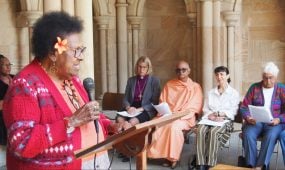What is Advent?
Reflections
Advent is a season of anticipation and preparation, providing Christians with a time to direct hearts and minds “to Jesus’ ‘first coming’, as the child of Bethlehem, His ‘second coming’ at the end of the age, and His many comings in the events of everyday life,” reflects The Ven. Keith Dean-Jones, Rector of the Anglican Parish of Bundaberg and Archdeacon of Burnett

Since childhood, I have liked the season of Advent. We live in a culture that commercialises Christmas, and from late November until the end of the year it is hard to escape from tinsel, reindeers and plastic trees. For many, Advent can be a ‘Cinderella season,’ and its significance can be squeezed out by the unsightly and the trivial. But, it can provide us with an opportunity to rediscover meaning in the face of materialism. Advent is both counter-cultural and important.
The word ‘Advent’ is derived from a Latin word that means ‘coming’, and it refers to Jesus’ ‘first coming’, as the child of Bethlehem, His ‘second coming’ at the end of the age, and His many comings in the events of everyday life. Jesus challenges us to be alert, and penitential purple vestments remind us that we are to turn away from distractions and self-indulgence so that we may recognise that He is ‘Emmanuel’, or ‘God with us’. Advent is a season to be awake to the presence of our Lord and to repent of self-absorption.
I regard the Liturgy as a ‘blue-print’ for Christian spirituality. In the western Church, there are four occasions at Mass when the priest greets the congregation with the salutation, “The Lord be with you”. It is a phrase that first appears in the Old Testament and is Boaz’s greeting to his barley reapers (Ruth 2:4). In Christian liturgical theology, the phrase indicates the presence of Jesus, and traditionally it is used to welcome the people when they assemble for worship, during the reading of the Holy Scriptures, at the beginning of the Eucharistic prayer and as a preface to the blessing of the people at the end of the service. The salutation works a bit like traffic lights, and it indicates that it is Jesus who gathers us together, who speaks to us in His Word, who sustains us with the Eucharistic meal and who sends us out as instruments of His compassion, reconciliation and peace.
Advertisement
It is the salutation before the blessing of the people that interests me, and although it is not prescribed for use in most Anglican rites, its use can help us to understand the meaning of ministry. The blessing is not a topping up of the tank of Grace just in case some may have evaporated between communion and the end of the service. Rather, it is an affirmation that we will meet Jesus when we are sent into the world.
I think that the ‘real presence’ of Jesus that we experience in our own lives, and the ‘real presence’ that we experience in gathering, Word and sacrament, is a ‘real presence’ when we minister in His name. Jesus wants us to gather before we are scattered, to listen to Him before we speak, to receive from Him before we give, and to meet Him when we care for friends and neighbours.
Advertisement
In the Gospel, Jesus is revealed as the one who is alert to the needs of the sick, the outcast and the poor. He is sensitive to the woman with the flow of blood and He allows himself to be made ritually impure by her touch (Mark 5: 24-34). He notices Zacchaeus sitting on a tree branch in Jericho and He offers friendship (Luke 19:1-10). He is aware of two blind men sitting by the Jericho roadside and He heals them (Matthew 20: 29-34). He speaks to the woman who had been caught in the act of adultery and He puts himself in a place of danger when He challenges her accusers and forgives her sin (John 8: 1-11). At all times, He is aware of human need. This is the purpose of the blessing of the people. First, it is a prayer that we may see others as Jesus sees them and to look with eyes of compassion. Secondly, it is a prayer that we may recognise that He is present with them and with us in all our encounters.
Many Australians experience a ‘blue Christmas’, and memories of loved ones who have died, painful reminders of relationship breakdowns and the many disappointments of life seem to be highlighted during ‘the season to be jolly’.
But, it is also an opportunity for ministry and to be overjoyed in meeting Him who loves all.





